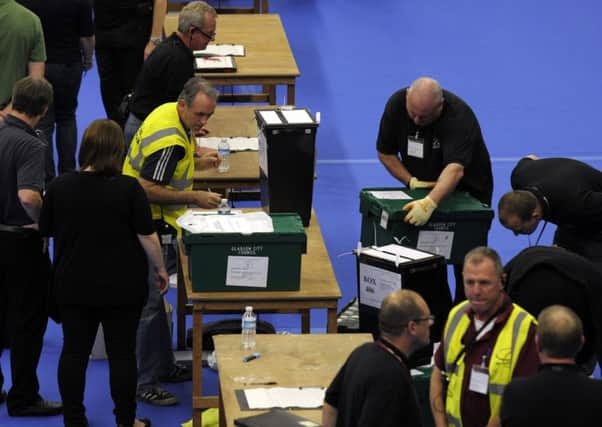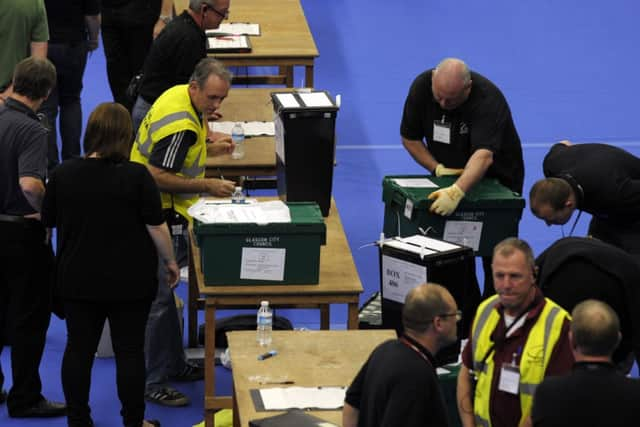Glasgow gives full backing to Scottish independence


With three quarters of registered adults in Glasgow voting - a turnout of 75% - the Yes campaign won by 53.5% to 46.5% of votes for No.
All of the city’s eight Scottish Parliament constituencies favoured Yes. Although the result did not change the national picture, it represented a significant blow for Glasgow’s Labour-led local authority and Johann Lamont, the leader of Scottish Labour.
Advertisement
Hide AdAdvertisement
Hide AdDeputy First Minister Nicola Sturgeon and Ruth Davidson, leader of the Scottish Conservatives, were among those watching results tumble in from around the country at the Emirates Arena.


For the Yes camp, the win by 194,770 votes to 169,347 offered some consolation on an arduous evening, especially as No victories came thick and fast in the space of a half hour from around 4.15pm.
While positive results for Yes, such as West Dunbartonshire, North Lanarkshire and Dundee, elicited hearty cheers from pro-independence supporters, they were to prove insufficient as Scotland voted No in droves.
Speaking after the Glasgow result, Nicola Sturgeon refused to admit Yes had been beaten.
“I’m not going to concede anything at the moment. Obviously we’ve had some spectacular wins like the one here in Glasgow and we’ve seen a number of Labour heartlands voting Yes.
“There are results still to come and although there have been some that are disappointing for Yes, what is clear is that Scotland has changed forever. It will never be the same again, most because of the very high turnout and the strong appetite for change. I think that is what I would detect from the results overall so far.”
She added: “If there is not a Yes vote tonight and we fall narrowly short, what we have seen is hundreds of thousands of people voting for change, many of them for independence and perhaps many of them voting no for independence because they believe further powers are coming.
Advertisement
Hide AdAdvertisement
Hide Ad“Either way, whatever the final outcome, Scotland is not going to be the same again. That demand for change will have to be met. One of the big things has been the turnout which has been phenomenal. This has been a wonderful campaign and the people of Scotland have really found their voice.
“Having gone through this hugely empowering campaign, people are not going to sit back and watch any politician renege on their promises.”
As politicians and the international media gathered at the Emirates late Thursday night, uncertainty remained over the crucial question: how Glasgow had voted. The multitude of polls carried out in the lead up to Scotland’s date with destiny gave no clear indication of a result.
Back in June, a Survation poll found that 44.5% of respondents supported Yes, compared to 35.4% for No. On 13 September, however, the same pollsters reported a shift, with 45.3% backing yes and 54.7% No. In the end, though, the result was relatively comprehensive for Yes.
Ruth Davidson, leader of the Scottish Conservatives, arrived at the Emirates at around 2.45am in an upbeat mood as the national picture looked to be going in No’s favour.
Despite the loss in Glasgow, she dismissed suggestions the relatively low turnout in Glasgow had been a positive for the No campaign.
“In Glasgow, I think hand on heart most people wanted the turnout to be as high as it could possibly be,” she said.
The Clackmannanshire win for No, Ms Davidson added, was an early sign of the big No surge. That council, she explained was “demonstrative of the kind of areas that Yes needed to win.”
Advertisement
Hide AdAdvertisement
Hide AdShe added: “The big story of the night is turnout and it’s been fantastic for Scotland, right across the country. For the turnout to reach 75% in Glasgow given what we saw at the European elections just a couple of months ago is phenomenal.”
Joe McCauley, the referendum agent for Better Together’s campaign in Glasgow, said the turnout shoed that “all the campaigns have been connecting equally with members of the public.”
In Glasgow, 363,664 votes were cast. In some wards, the Yes vote was conclusive, with a majority of nearly six thousand in Maryhill and Springburn and Glasgow Provan, results that will give Labour politicians in the city much cause for concern.
Although the turnout was lower than other parts of the country, it still made electoral history in the city. In the 1997 referendum on Scottish devolution, the region recored an unenviable turnout of just 51.2%, the lowest of any local authority and well under the national average of 60.2%.
On the ground yesterday, numerous polling stations across the city’s boundaries reported lengthy queues when they opened at 7am. One, in the southside area of Battlefield, reported 150 votes cast in the first 10 minutes. Throughout the day, the turnout remained very high, with the vast logistical operation seeming to run smoothly. In all, there were 438 polling stations in 200 buildings across the city, with 1,188 staff on hand.
Given the size of its population, the largest count in the country was expected to play have an influential bearing on proceedings. In the end, it was good news for Yes, but it came too late to bolster a flagging campaign, although it will likely cause tremors in Glasgow’s political landscape for some time to come.